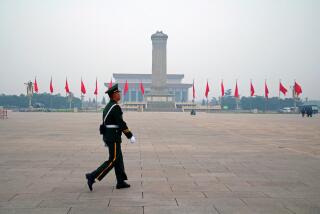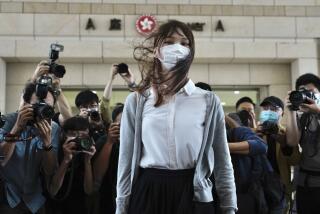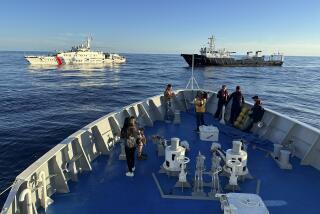Another critic of China’s Xi Jinping is barred from Hong Kong
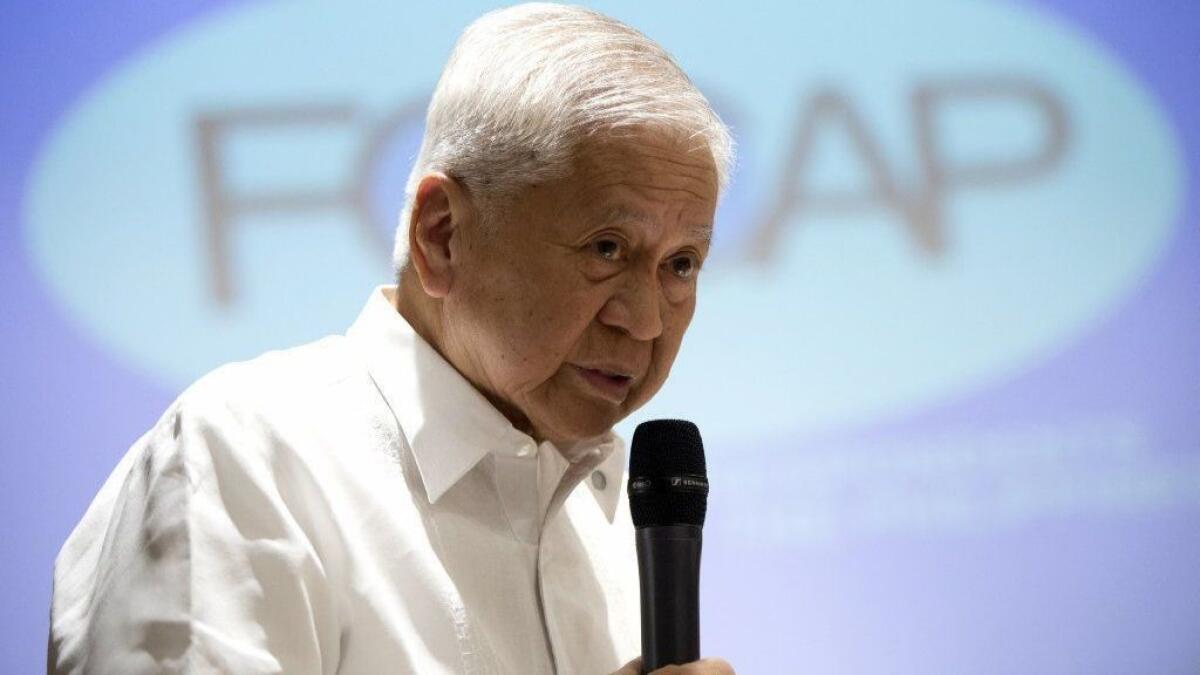
The Philippines’ former top diplomat, an outspoken critic of Chinese President Xi Jinping, was prevented from entering Hong Kong on Friday, renewing concerns over Beijing’s ability to target foreign political and business leaders in the semiautonomous island.
Albert del Rosario said he was detained at Hong Kong airport upon arrival from Manila on Friday morning, questioned for several hours and then denied entry without explanation — the second former top Philippine official to be barred in as many months.
Del Rosario, who said he was traveling on a diplomatic passport to attend a business meeting, described his treatment as a violation of the Vienna Convention, an international treaty that provides certain protections to diplomats overseas.
Hong Kong immigration agents held him for about six hours before ordering him onto a flight back to Manila around 2 p.m., his lawyer said. The 79-year-old landed in Manila and was seen at Ninoy Aquino International Airport in a wheelchair.
“The immigration authorities just gave the vague reason of ‘immigration reasons’ ” for sending him back, the lawyer, Anne Marie Corominas, told ABS-CBN, a Philippine news network. “To this point, we still don’t know exactly what the reason was.”
It was a virtual repeat of what happened last month to Conchita Carpio-Morales, a former justice of the Philippine Supreme Court, who was denied entry at Hong Kong airport when she flew there for a vacation.
Both were on Beijing’s radar: In March, Carpio-Morales and Del Rosario had filed a complaint at the International Criminal Court over China’s aggressive push to seize territory and build military facilities in the disputed South China Sea.
Their filing attempts to hold Xi directly accountable for China’s construction of islands and reefs in the strategic waterway, alleging the policy had degraded the environment, deprived Filipino fishermen of their livelihoods and possibly constituted crimes against humanity. Chinese officials have dismissed the case as “a fabrication.”
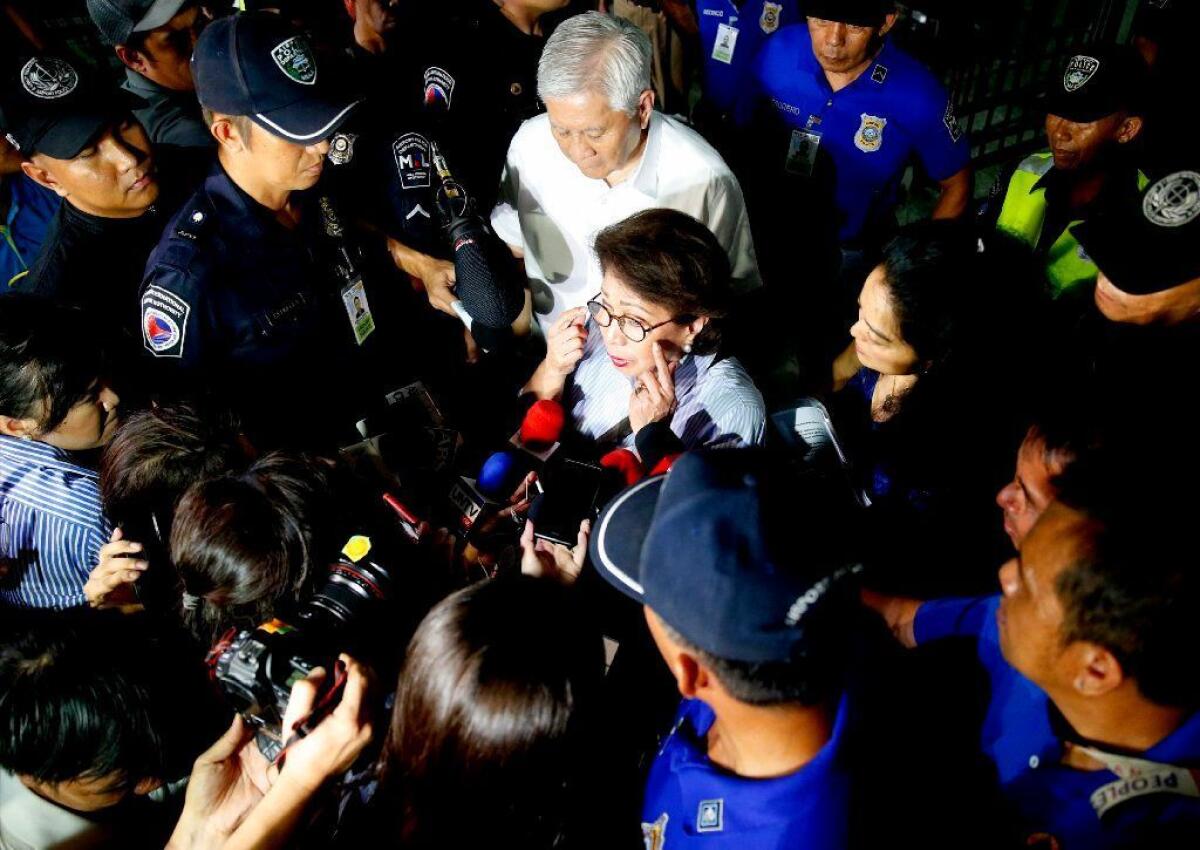
The action against Del Rosario came as opponents of a controversial extradition bill reassembled outside Hong Kong police headquarters Friday to demand an investigation into the crackdown against demonstrators last week, the most serious political unrest in the Chinese-controlled territory in years.
The legislation would allow Hong Kong to send people to China for trial, further eroding the special legal protections Beijing promised when it took over the island from Britain in 1997.
In the face of massive public protests, Hong Kong’s chief executive last week shelved the bill, but opponents have returned to the streets to demand it be scrapped completely.
The treatment of Del Rosario — who flew to Hong Kong to attend a meeting at an investment company where he serves on the board of directors — illustrates what prominent business leaders fear could happen as China consolidates its control over one of the world’s leading financial centers.
Hong Kong is a key business and leisure hub for the nearby Philippines, and Del Rosario, who served as ambassador to Washington and then as foreign secretary from 2011 to 2016, is one of many prominent regional leaders with investments in the island.
“If you are one of those Southeast Asian officials watching what is happening to Del Rosario today, it’s likely to have a chilling effect on the extent to which you are willing to criticize Beijing,” said Aaron Connelly, a research fellow in Singapore at the International Institute for Strategic Studies.
“[And] if you are a business figure looking to get into politics, you might also think about moving your money somewhere else so as to have a free hand to deal with China, which could erode Hong Kong’s reputation as a safe place for capital.”
Connelly described the detentions of Del Rosario and Carpio-Morales as “a pattern of harassment” of Filipinos critical of Beijing — at a time when anger is mounting in the Philippines over perceived Chinese aggression in the South China Sea.
Two weeks ago, a Chinese vessel collided with and destroyed a Philippine fishing boat anchored off Palawan, a Philippine island southwest of Manila. According to accounts given to Philippine media, the Chinese ship left the 22 Filipino fishermen stranded at sea, where they floated for hours until being rescued by a Vietnamese fishing boat.
Philippine officials initially condemned China for abandoning the fishermen, but later softened their words. Defense Secretary Delfin Lorenzana termed the collision an accident, and President Rodrigo Duterte — who has been criticized for being too close to Beijing — called it only a “little maritime incident.”
Although Duterte remains popular, his tilt toward China, while criticizing longtime ally the United States, is producing a backlash among even some members of his government.
Duterte withdrew the Philippines from the International Criminal Court this year after the court launched a preliminary investigation into mass killings in his antidrug campaign, which has drawn international condemnation. The court has said the case would continue, although Duterte has pledged not to cooperate.
Duterte has played down the significance of Del Rosario’s complaint against Xi and told China the Philippine government was not involved in the matter.
More to Read
Start your day right
Sign up for Essential California for news, features and recommendations from the L.A. Times and beyond in your inbox six days a week.
You may occasionally receive promotional content from the Los Angeles Times.
